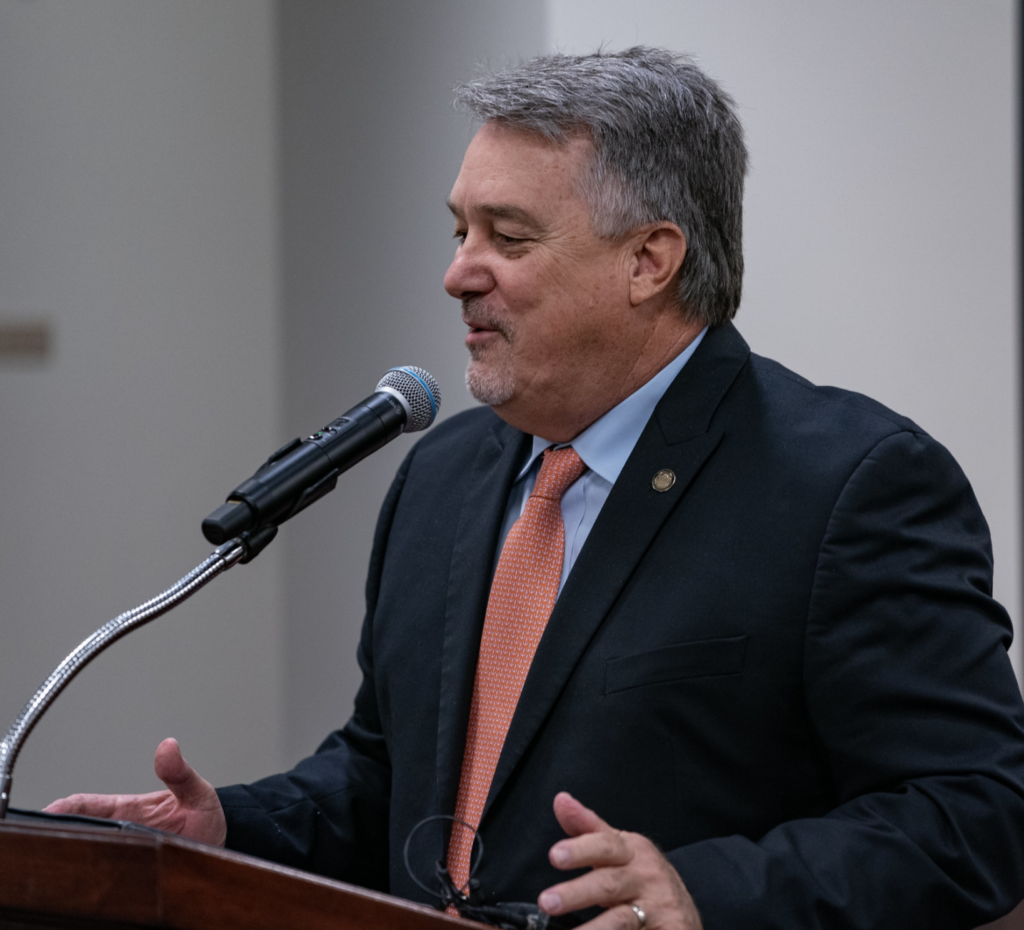Rosa Parks statue for Alabama State Capitol grounds gets final approval

Alander Rocha, Alabama Reflector The Alabama Women’s Tribute Statue Commission Friday approved the final design for a statue of Rosa Parks statue that will sit near the entrance of the Alabama State Capitol. Several members of the commission traveled to sculptor Julia Knight’s studio in Decatur, Georgia to see the working model of the statue of the civil rights icon. Knight said that designing the statue has been a “labor of love.” “I am feeling a little tired, but I’m also feeling a little sad that now I’m going to let go of Rosa,” Knight said. Commission members, present both in Georgia and virtually, praised the 15-foot model of the statue. It shows Parks stepping up on a raised platform, looking forward with her coat blowing in the wind. She will face South Bainbridge St. at an angle towards the steps leading up to the Capitol, allowing visitors to see her as they walk up. Parks will be the first woman depicted on the Alabama State Capitol grounds. Tracy Morant Adams, a Birmingham banker and member of the commission, said the statue captures Parks’ determination. “When you look at [her braid], it is very detailed in the back, and then also the momentum, the movement of the coat of the cult shows progression. I think that you capture that quite well,” she said. Annie Butrus, a Birmingham-based painter and member of the commission who attended the meeting virtually, said that Knight accomplished “a nearly impossible feat of creating this incredibly powerful yet delicate” design. “I love the way you’ve modeled her feet; that really shows the strength and the determination, and the absolute assurance of where she was heading,” Butrus added. Adams agreed. “Just from looking here — it seems absolutely beautiful and you’re right, Annie, regarding her stance — her feet so firmly planted with so much power. I see power there. It’s beautiful,” Adams said. The commission is also tasked with erecting a Helen Keller statue on the Capitol grounds. The Keller statue will be to the left of the back entrance, facing the current statehouse. That building is expected to be demolished after a new statehouse is completed sometime in the next three years. It is expected to be replaced by green space. The statues are expected to cost about $611,000. The commission has raised about $700,000 for the statues. Remaining money will pay for any additional costs. The Parks statue was funded in part by a $300,000 grant from the Alabama Power Foundation. The grant cannot be used for the Keller statue but will likely be used for ongoing maintenance on the Parks’ statue. Funding for the Keller statue, expected to cost almost $300,000 ($245,000 for the sculptor and $50,000 for site preparation), was not clear earlier this year. In the spring, the Alabama Legislature approved HB 125, a supplemental appropriations bill sponsored by Rep. Rex Reynolds, R-Huntsville, and spearheaded by Hall that allocated $200,000 towards the Keller statue. The commission is also accepting donations for the statue. Parks, a longtime civil rights activist, was arrested on Dec. 1, 1955, for refusing to give up her seat to a white passenger. Parks’ arrest led to the Montgomery Bus Boycott, considered the start of the modern civil rights movement. Montgomery’s Court Square, where Parks caught the bus on Dec. 1, 1955, features a life-size statue of Parks. A statue of Parks also resides in the U.S. Capitol. The Alabama Women’s Tribute Statue Commission was formed in 2019 to plan and erect statues of Rosa Parks and Helen Keller on the grounds of the Alabama State Capitol. The commission consists of six members and is chaired by Rep. Laura Hall, D-Huntsville. The statue will be cast at a foundry, which could take six months to complete the statue. It could be unveiled by the middle of next year, though it is not known when it will be ready for installation. “She is going to just be this beacon of feminine strength. It’s just great,” said Butrus. Alabama Reflector is part of States Newsroom, a network of news bureaus supported by grants and a coalition of donors as a 501c(3) public charity. Alabama Reflector maintains editorial independence. Follow Alabama Reflector on Facebook and Twitter.
Akiesha Anderson: Alabama’s grocery tax reduction: A penny saved, a better future paved

The first stop on the road to untaxing groceries in Alabama is straight ahead. Lawmakers achieved a significant victory for the people this year by passing legislation to cut the state’s 4-cent grocery tax by half. That change will begin this Labor Day weekend, as the first 1-cent reduction takes effect September 1. Ultimately, this small change likely will result in large savings for Alabamians who are working hard to make ends meet. Once the new law is fully implemented, many families will have hundreds of dollars more available each year to spend on food or other expenses. For decades, Alabama Arise has focused on reducing and ultimately eliminating the state sales tax on groceries, which essentially taxes survival. At the beginning of the 2023 legislative session, Alabama stood as one of only three states with no tax break on groceries. Thanks to determined advocacy by Arise members and other advocates, our state is off that shameful list at last. The story behind the legislative triumph Arise collaborated this year with many partners and lawmakers to introduce and pass the grocery tax reduction. That list includes the Alabama Grocers Association, Lt. Gov. Will Ainsworth, Sens. Andrew Jones and Merika Coleman, and Reps. Danny Garrett and Penni McClammy. This year’s breakthrough also would not have happened without other legislative champions who laid the groundwork for this moment, including former Reps. John Knight and Thad McClammy, former Sen. Hank Sanders and Reps. Laura Hall, and Mary Moore. The grocery tax law’s passage is a testament to the importance of continuing to hold the line and fight for change for as long as it takes. It’s also a testament to the importance of seizing the moment when opportunity arrives. Something spectacular happened this year as the stars finally aligned after decades of advocacy. When this year’s session began, many Alabamians were struggling with inflation and higher costs for essentials like eggs and bread. Simultaneously, the state was witnessing strong revenue growth. As elected officials began talking about one-time tax rebates, advocates recognized an opportune moment to make permanent progress on reducing the state grocery tax. And the revenue growth ensured this reduction would not cause severe harm to funding for our children’s public schools. A positive step forward State leaders seized this window of opportunity and united across partisan lines to reduce the grocery tax. It was amazing to witness the culmination of decades of hard work. And it was inspiring to see nearly every legislator co-sponsoring this monumental legislation. Many lawmakers tout this as the state’s largest tax cut ever, and it is one that will provide the biggest everyday benefit to people with low incomes. Ultimately, Alabama Arise remains dedicated to transforming the state’s regressive tax system into a more progressive one. Progressive tax systems levy taxes based on one’s ability to pay, whereas regressive systems work in the reverse. The grocery tax has long exemplified regressive taxation, burdening those with fewer resources by requiring them to pay proportionally more than wealthier individuals. Reducing the state grocery tax is a step in the right direction for tax justice. This penny saved is symbolic of a better future being paved for Alabama. What lies ahead Arise will continue advocating to eliminate the state grocery tax while protecting Education Trust Fund revenues. We look forward to working with the new Joint Study Commission on Grocery Taxation to find a sustainable path forward. Rebalancing Alabama’s upside-down tax system will require both lower taxes for people with low incomes and higher taxes for wealthy households and highly profitable corporations that can afford to pay more. As this year’s grocery tax reduction takes effect, we celebrate its many champions – most notably the Alabamians who stayed vigilant to ensure their voices translated into tangible policy improvements. We also celebrate this policy change as a symbol of progress and unity, and as a testament to what state leaders can accomplish when they put partisanship aside to pass legislation with profound benefits for individuals and communities. Cheers to eliminating the first cent, and to the ongoing journey toward a more prosperous and equitable Alabama! Akiesha Anderson is policy and advocacy director of Alabama Arise, a statewide, member-led nonprofit organization advancing public policies to improve the lives of Alabamians who are marginalized by poverty. Arise’s membership includes faith-based, community, nonprofit and civic groups, grassroots leaders, and individuals from across Alabama.
Public meetings on congressional redistricting announced

On Wednesday, State Sen. Steve Livingston (R-Scottsboro) and State Rep. Chris Pringle (R-Mobile), who serve as the joint chairs of the Permanent Legislative Committee on Reapportionment, announced a series of meetings and deadlines on the looming congressional redistricting. The first meeting will be on June 27 at 1:30 P.M. in the Alabama State House Room 200. This will be a meeting of the Joint Committee and a public hearing. People unable to attend can watch the proceedings online at the Legislature’s website. July 7 at 5:00 P.M. is the deadline for all plans to be submitted to the Reapportionment Committee. You can contact the committee directly by email at: district@alsenate.gov. The committee will meet again and hold a public hearing on July 13 at 1:30 P.M. in State House Room 200. On August 14, there will be a hearing at Hugo L. Black United States Courthouse in Birmingham. The House members serving on the Permanent Legislative Committee on Reapportionment members include Cynthia Almond (R-Tuscaloosa); Barbara Boyd (D-Anniston); Jim Carns (R-Birmingham); Steve Clouse (R-Ozark); Corley Ellis (R-Columbiana); Chris England (D-Tuscaloosa; Laura Hall (D-Huntsville); Sam Jones (D-Mobile); Joe Lovvorn (R-Auburn); and Rex Reynolds (R-Huntsville). In 2022 a three-judge panel of the Eleventh Circuit Court of Appeals rejected Alabama’s 2021 congressional redistricting as being in violation of the Voting Rights Act of 1965—the U.S. Supreme Court, which earlier this month agreed. The three-judge panel has given the Legislature until the middle of next month to submit a new congressional redistricting plan to the federal court. The three-judge panel has ordered the Legislature to submit a new map with two majority-minority districts or something as close to that as possible. Alabama Governor Kay Ivey is expected to call a special session no later than July 17 to attempt to comply with the court order. If the Legislature cannot reach an agreement on a redistricting plan by July 21, or the Court does not like the State’s plan, then the three-judge panel may appoint a special master to draw the districts for the State. Republicans currently control six of Alabama’s congressional seats, while Democrats control only the Seventh Congressional District. None of the seven congressional races were competitive during last year’s general election. The redistricting could make two of those districts winnable for Alabama Democrats. It could also cost Democrats a seat if they make it too competitive. To connect with the author of this story or to comment, email brandonmreporter@gmail.com.
Nathaniel Ledbetter announces appointments to the Reapportionment Committee

On Tuesday, Speaker of the House Nathaniel Ledbetter announced that he had appointed a number of House members to serve on the Permanent Legislative Committee on Reapportionment. The House members appointed are: Cynthia Almond (R-Tuscaloosa) Barbara Boyd (D-Anniston) Jim Carns (R-Birmingham) Steve Clouse (R-Ozark) Corley Ellis (R-Columbiana) Chris England (D-Tuscaloosa) Laura Hall (D-Huntsville) Sam Jones (D-Mobile) Joe Lovvorn (R-Auburn) Chris Pringle (R-Mobile) Rex Reynolds (R-Huntsville). Since this is a joint committee, it is also made up of members of the Senate. The appointment of 11 members from the House would indicate an expansion of the committee. According to the committee website, the joint committee has just six members: Sens. Steve Livingston, Dan Roberts, and Bobby Singleton, and Reps. Kyle South, Laura Hall, and Chris Pringle. South is leaving the Legislature at the end of the month to accept a position as President and CEO of the West Alabama Chamber of Commerce. Presumably, the Senate will now appoint another eight joint committee members. The Joint Committee on Reapportionment normally redistricts the congressional districts, the state board of education districts, and legislative districts every ten years following the decennial census. In 2022 a three-judge panel of the Eleventh Circuit Court of Appeals rejected Alabama’s 2021 congressional redistricting as being in violation of the Voting Rights Act of 1965. Alabama appealed to the U.S. Supreme Court, which earlier this month found that the lower court was correct in its interpretation and has restored the lower court’s ruling that the state is in violation of the Voting Rights Act. The three-judge panel has given the Legislature until the middle of next month to submit a new congressional redistricting of the state to the federal court. The three-judge panel has ordered the Legislature to submit a new map where there are two majority-minority districts or something as close to that as possible. Alabama Governor Kay Ivey is expected to call a special session no later than July 17 to attempt to comply with the court order. If the Legislature cannot reach an agreement on a redistricting plan by July 21 or the Court does not like the State’s plan, then the three-judge panel may appoint a special master who will draw the districts for the state. Republicans currently control six of Alabama’s congressional seats, while Democrats control only the Seventh Congressional District. None of the seven congressional races were competitive in the general election last year. The redistricting could make two of those districts winnable for Alabama Democrats. To connect with the author of this story or to comment, email brandonmreporter@gmail.com.
Lawmakers approve expansion of private school scholarship program

Alabama lawmakers approved on Wednesday an expansion of a scholarship program aimed at helping low- and moderate-income students attend private schools. The House of Representatives voted 75-22 for the bill that would expand income eligibility and make other changes to increase the number of students participating in the program. The measure now goes to Gov. Kay Ivey. The bill advanced as Republicans across the country have championed various forms of so-called “school choice” legislation, ranging from vouchers to scholarship programs, to provide public support for private school or other alternative school options. “More children will have access to it,” Republican Rep. Terri Collins, of Decatur, said of the legislation during debate. Republican Sen. Donnie Chesteen, the bill’s sponsor, estimated last week that the number of students participating in the program could increase from about 3,000 to 4,400 with the changes. The existing program, known as the Alabama Accountability Act, gives tax credits for donations to organizations that provide the scholarships. Scholarship priority is given to students zoned to attend schools labeled as “failing” because they are in the lowest 6% of test scores. It also gives tax credits to help families transfer out of schools that have been designated as “failing.” The approved legislation raises the income cap for new scholarships from $55,500 for a family of four to $75,000. It expands eligibility to also include students with Individualized Education Programs because of a diagnosed learning disability or other condition. The bill raises the maximum scholarship to $10,000 per student. It would also provide more money for the program by gradually raising the annual cap on the tax credits from $30 million to $40 million and eventually up to $60 million. It would also do away with the label of “failing” school and replace it with “priority” schools. Schools would be given that label based on receiving a D or F on state report cards instead of just test scores. Republicans created the Alabama Accountability Act in 2013, pushing through the bill via conference committee during a chaotic legislative night. “I always have a bad taste in my mouth about this bill,” Democratic Rep. Laura Hall, of Huntsville said. Republished with the permission of The Associated Press.
Alabama legislators urge Air Force Secretary Frank Kendall to support congressional investigation into Space Command decision

On Tuesday, a bipartisan group of legislators in the Alabama House of Representatives sent a letter to U.S. Airforce Secretary Frank Kendall supporting the congressional investigation led by U.S. House Armed Services Committee Chairman Mike Rogers and Congressman Dale Strong. The letter was signed by Speaker of the House Nathaniel Ledbetter, House Minority Leader Anthony Daniels, House Majority Leader Scott Stadthagan, and Speaker Pro Tem. Chris Pringle, as well as Reps. Joe Lovvorn, Danny Garrett, Wes Kitchens, Laura Hall, Parker Moore, David Cole, Rex Reynolds, Andy Whitt, James Lomax, Ritchie Whorton, and Phillip Rigsby. An NBC news report released on May 15 claimed that President Joe Biden will intervene to keep the Pentagon from moving Space Command from Colorado to Huntsville. The President’s objections to the state of Alabama are reportedly due to the state’s ban on abortion. Many speculate that the real reason could be political in that Colorado voted for Biden in 2020, while Alabama did not. Below is the text included in the attached letter: “Dear Secretary Kendall, “As members of the Huntsville and Madison delegations of the Alabama House of Representatives, and as House leadership, we are writing to you in support of the House Committee on Armed Services’ investigation into the delay in implementing the recommendation to place U.S. Space Command (SPACECOM) Headquarters at Redstone Arsenal, which is being led by U.S. House Armed Services Committee Chairman Mike Rogers and Congressman Dale Strong.” “As you are aware, it has been made clear through multiple U.S. Air Force recommendations that the most strategic location for the U.S. Space Command headquarters is Redstone Arsenal in Huntsville, Alabama. The Government Accountability Office and Department of Defense Inspector General have both confirmed this recommendation was made through a sound process. Huntsville has the infrastructure, the workforce, the education system, engineering base, existing military and defense apparatus, and quality of life to be the ideal location for U.S. Space Command. This is why this site has received the unanimous number one recommendation from the U.S. Air Force.” “As representatives of the communities surrounding Redstone Arsenal in the Alabama House of Representatives, we felt the need to respectfully encourage you to support and comply with the congressional investigation into the delay of this critical national security decision. We are also concerned to learn the U.S. Department of Defense was not aware, and not involved, in this change. The people of Alabama and the United States of America need and deserve transparency on the apparently revised mission requirements of SPACECOM as it relates to its decision to locate its headquarters.” “A lengthy delay in making a decision this important to national security deserves Congressional oversight, and we are thankful that Congressmen Rogers and Strong recognized this need and are taking action by launching this investigation. We greatly appreciate your service to our nation and the role that the U.S. Air Force has in keeping our country, and the world, safe from threats, and we believe that you also appreciate the need for transparency and Congressional oversight.” On Friday, Fox News published a story detailing an announcement from Rogers that he is opening an investigation into the continued delays in the selection of a permanent base for the U.S. Space Command (SPACECOM) Headquarters. “Today, I launched an investigation into the continued delays in the SPACECOM Headquarters basing decision,” said Chairman Rogers. “The fact is, the Air Force already made the correct decision well over two years ago. That decision was affirmed by the GAO and the DoD Inspector General over a year ago. This decision was based on multiple factors, and Redstone Arsenal in Huntsville, Alabama, was the clear winner in the Evaluation and Selection phase. I am deeply concerned that the continued delays in making this move final are politically motivated and damaging to our national security.” “I have requested that House Armed Services Committee Chairman, Mike Rogers, open a formal investigation into the Biden Administration’s failure to announce a permanent location for U.S. Space Command (SPACECOM) Headquarters,” said Rep. Strong.“The Administration’s delay risks politicizing a process which must remain fact-based. Injecting politics into America’s basing decisions serves to do unprecedented harm to our national security. American men and women in uniform must be given the very best, not the third or fourth choice. Redstone Arsenal was chosen as the preferred location after a years-long process. The decision was later confirmed not just once, but twice with the results of the Government Accountability Office and Department of Defense Inspector General investigations. It is plain and simple: Redstone Arsenal is the best possible location to host U.S. Space Command headquarters. The Air Force’s basing process established this, and it was confirmed. I thank Chairman Rogers for agreeing to this investigation. The members of the House Armed Services Committee, and our service members awaiting a final basing decision, deserve answers and swift action from the Air Force.” The letter by the State Representatives followed the announcement of the investigation by Rogers. To connect with the author of this story or to comment, email brandonmreporter@gmail.com.
Alabama House votes to align Alabama gun law with federal law

On Wednesday, the Alabama House of Representatives voted to pass controversial legislation that would largely align Alabama’s criminal possession of a firearm with its federal law equivalent. House Bill 392 (HB392) is sponsored by Cynthia Almond. “This adopts the federal law on gun possession as it is currently,” Rep. Almond explained. Rep. Mary Moore asked, “I don’t understand why we need this bill. Why do you think we need to be redundant passing this law?” Almond explained, “Federal law says that if you have ever been convicted of a felony, you can’t carry a gun. Alabama law says that if you have ever been convicted of a crime of violence, you can’t carry a weapon.” Moore said, “This is a redundant bill that does not need to be clarified.” Almond replied, “There are some felonies that are in the gap.” Moore said that instead of debating this bill, the Legislature should take up her assault weapons ban. “We passed enough laws that cover what you try to do,” Moore said. “We ought to be focused on true laws.” “AR15s are weapons of war that were made for the battlefield of Vietnam,” Moore said. “They shoot up babies so bad you can’t even identify them.” Almond explained, “theft and possession of drugs are two” of the felonies where a felon is prohibited from ever possessing a firearm ever again’ but not prohibited under current Alabama law. “Our state and local law enforcement do not have the authority to arrest them, even though they are already in the prohibited person’s database,” Almond explained. Rep. Laura Hall asked, “You don’t have to have a permit to carry a gun, so how do you get that data?” Almond said, “If they have ever been convicted of a felony, they are in a database.” Hall said there are other disqualifiers for gun possession besides being convicted of a felony. “We are not dealing with any of the other items in this bill,” Almond said, “We can see that they are in the database, but we can’t arrest them (for being a felon in possession of a gun).” Almond explained that this bill changes state law to mirror federal law. Almond cautioned that this only has to do with felons. “We are not at all changing or addressing any of those others,” Almond said. Rep. Matt Simpson explained, “A lot of time, the federal government and federal prosecutors say they are not going to enforce this. All this does is give (state) prosecutors the authority to.” Almond said, “We are not changing any rights, but we are allowing our police and prosecutors to make arrests and prosecutions.” Almond said the current law “puts our law enforcement in predicaments on the streets.” Rep. Prince Chestnut said, “I am going to support your bill.” Rep. Pete Rehm asked, “Has anyone asked if the NRA or any Alabama gun rights organization endorsed this bill.” Almond said, “We have worked with the NRA.” Rep. Rehm asked if a woman in her 70s defends herself from a home invasion with a gun, but she had a drug possession conviction fifty years ago, would she be arrested under this? Almond said that if she had a felony conviction and has a gun, she is already breaking the law. “We would be basically enforcing federal law,” Almond said. Rehm said, “In my scenario, the lady defended her home from a home invasion. Right now, the state or local law enforcement cannot arrest her. “ Rehm said, “My issue is that the federal government needs to be enforcing their own laws.” Almond replied. “If your position is that felons should have guns, that has not been the case for over 60 years.” Rehm responded, “In all that time, the state of Alabama has not done anything to enforce this federal law.” Rep. Corey Harbison said, “I come from a law enforcement background myself, and I am not for putting good people in jail because they made a mistake 20 years ago. This example right here is why we have a separation between federal and state.” Harbison said, “The NRA is not in support of this bill. They are not against, but they are not taking a stance.” “We do not have to align our state law with federal law,” Harbison said. “People make mistakes in life. They can be rehabilitated.” Almond said, “There is a process where someone can have their gun rights restored.” Harbison warned that there will be “unintended consequences” if this passes. “I, as law enforcement, do not want to take them to jail.” Moore said, “We as a body should not care what the NRA thinks.” Rep. Alan Treadaway said, “There was a time where we routinely could make these arrests, and federal authorities would come get them. Now, they are pressed as hard as we are. People don’t realize how bad it is out there now with violent crime. There are now 500 less officers in Jefferson County alone.” Treadaway blamed “the demonization of police over the last ten years.” “I have talked with them (the NRA) several times,” Treadaway said. “If they were opposed, you couldn’t answer your phones.” “Your DAs want this. The judges want this,” Treadaway said. “The (prohibited persons) database will work ten times better than any permit.” Treadaway said he talked with one assistant DA in St. Clair County who has arrested one person “nine times for breaking into vehicles, has a gun, and you can’t arrest him.” Almond said, “This bill was brought to me by Tuscaloosa DA Hays Webb. He is a former Marine. He is pro-law and order, and he is pro second amendment. The person who brought this to me is about as a pro second amendment as possible. He is a big gun guy.” One Republican Representative said, “I don’t trust the federal government as far as I can throw them.” Rep. Tim Wadsworth warned that the federal definition of a firearm under federal law doesn’t include shotguns or sporting rifles, but that could change. Almond said that this bill
House passes legislation making changes to the public charter schools statute

On Thursday, the Alabama House of Representatives passed legislation making several changes to the Alabama Public School Charter Commission. House Bill 363 (HB363) is sponsored by State Representative Terri Collins. The Alabama School Choice and Student Opportunity Act changes the appointment process for the Alabama Public Charter School Commission; authorizes the Commission to hire staff; requires commissioners to receive annual training; provides additional guidelines for the authorizing and application review process; provides further for the operational and categorical funding of public charter schools in their first year of operation; and clarifies the per pupil federal, state, and local funding of conversion public charter schools during their first year of operation. “All charter schools are public schools,” explained Rep. Collins. “We have three conversion schools in Montgomery, Mobile, west Alabama, Birmingham has a few, Fairfield, and there are a couple more in Montgomery.” “A public system could choose to make a starter school,” Collins stated. “If they have a specific need, they can do it through the charter process.” Collins explained how a public system can convert a failing public school to a charter public school through the formal conversion process. Rep. Tracy Estes thanked Collins for bringing the bill and the hard work in crafting the substitute. The House voted to adopt the negotiated substitute version of the bill to address issues that some members had with the original legislation in a 88 to 13 vote. Rep. Mark Gidley said, “I want to express my appreciation for how you have worked hard on this.” Rep. Jamie Kiel brought an amendment that would restore the local school board as an authorizer. An earlier version of the bill removed that. This amendment was ratified. “I appreciate you working with all of the parties on this,” Kiel said to Collins. Rep. Barbara Boyd said, “I want to thank you for where you have gone and for working with all of the parties, but I would still have preferred magnet schools because those are set aside for specific purposes. I am going to have to vote no today.” “They have to be nonprofit,” Collins said of charter schools. “They can’t be a for-profit. They have to have local support.” Rep. Laura Hall said, “African American boys have a great need, particularly between K and 3irth grade.” Hall said that she had visited the new aviation-focused charter school in Fairfield. “I have been there,” Collins said. “What they are doing is very exciting.” Collins said that students there can work on actual planes and “learn takeoff and landing through a simulator.” Hall said, “The dollars that the system has used sound like they are very well used.” Collins said, “They do everything that a public school does. They do ACAP. They give grades.” Collins said that members of the Commission would be appointed by the governor, the lieutenant governor, the Speaker of the House, the Senate Pro Tem, the House Minority Leader, and the Senate Minority Leader. “They look at applications, and they approve or disapprove,” Collin said of the Commission. “This extends their term from two years to four years.” Rep. TaShina Morris suggested changing the bill so that the state superintendent of education hires the Commission staff. Collins said, “No, we want the commission to choose their own employees.” Rep. Mary Moore said, “I don’t think the state of Alabama can support multiple forms of public schools with one pot of money for education.” Moore complained that the local school board can deny a charter application and “the state of Alabama will go ahead and authorize them to be a charter school when they know they are deficient.” Moore attacked the performance of charter schools. “They (students) are coming back to public schools, and they are not able to do the work,” Moore said. “They are not doing their due diligence. They are not hiring proper teachers. They have teachers that don’t even know how to set up a proper classroom.” Collins replied, “They all have a long waiting list to get in. I don’t know of any who are coming back.” Moore said, “They are taking dollars from the public schools, and they are hurting public schools because they are taking resources.” Collins said, “Charter schools are public schools.” The Alabama House passed HB363 in a 76 to 25 vote. The legislation now goes to the Senate for their consideration. Thursday was day 20 of the 2023 Alabama Regular Legislative Session. The House convenes at 1:00 p.m. on Tuesday. To connect with the author of this story or to comment, email brandonmreporter@gmail.com.
Alabama House passes bill to make it a crime to chemically endanger a first responder

Fentanyl has been a deadly scourge in the state killing thousands of drug users. It has also become dangerous for first responders who have to deal with drug dealers and drug users who are suffering from drug overdoses. House Bill 230 (HB230) is sponsored by State Representative Matt Simpson (R-Daphne). “This bill would create the offense of a criminal endangerment of a first responder,” Rep. Simpson explained, “With escalating penalties depending on the degree of the injuries to the first responder.” “If he knowingly, negligently, or intentionally injures a first responder with a scheduled one controlled substance,” Simpson said. “If it is just physical injury, it is a Class C felony. If it is a serious physical injury, it is a Class B felony. To cause the death of a first responder would be a Class A felony.” Of the four classes of felonies in Alabama – A, B, C, D – A is the most serious and typically carries the largest penalties. “Why did you not have this in your previous bill,” raising the penalties for fentanyl traffickers Rep. Juandalynn Givan asked. “I did not want to muddy the water with that bill,” Simpson explained. “Researching that bill, I talked with officers who had been injured in the line of duty from exposure (to drugs).” “It is not just being around it,” Simpson said. For the crime of chemical endangerment of a first responder, the injury must be caused by “ingestion, inhalation, or contact” with the controlled substance. Rep. Napoleon Bracy asked Simpson why he did not address this in the previous bill. “I did not want to add something on it,” Simpson explained. “I wanted that to get through clean. This came up while I was working on it. I heard so many stories from officers who had been injured. They have to get Narcan hit. They have to go to the emergency room. There have been serious injuries.” Bracy said, “You can have a crime scene that spills over into other areas.” Bracy, whose wife is in the medical field, wanted emergency room doctors and nurses who may be exposed to dangerous narcotics while tending to narco-traffickers also included in the definition of “first responders” in this bill. “I think we are missing a group of people that need to be included in this,” Bracy said. “They (the drug dealer/users) are either going to a hospital, a psychiatric facility, or a county jail. I think we need to include them.” Simpson said after some discussion with Bracy and staff, “They are included. The medical teams at the hospital would be included.” Rep. Laura Hall brought an amendment to the bill adding in some language to the bill. Simpson said that the Hall amendment was a friendly amendment. The Hall amendment was adopted in a 105 to 0 vote. The House of Representatives passed HB230 as amended on a 105 to 0 vote. The legislation now goes to the Alabama Senate for their consideration. Wednesday will be day 17 of the 2023 Alabama Regular Legislative Session. To connect with the author of this story or to comment, email brandonmreporter@gmail.com.
House passed legislation banning employers from requiring that employers be microchipped

On Thursday, the Alabama House of Representatives passed legislation that would prohibit employers from requiring that their employees have microchips inserted in their bodies. House Bill 4 (HB4) is sponsored by State Representative Prince Chestnut. Chestnut said that this bill’s purpose is “preventing the microchipping of employees by employers.” State Rep. Kenneth Paschal said, “I love your original bill as written, but I have a problem with an amendment in the committee substitute.” Chestnut said, “My plan is to table the committee substitute and pass the original bill.” “What are we doing?” Rep. Laura Hall (D-Huntsville) asked. “What is the intent?” “I read a lot, and one of the things that concerned me is a push in certain areas to microchip people in some places in the workplaces,” Chestnut said. “It is really catching on in Europe. It is taking place in parts of this country.” Hall asked where it was being done. “I did find where it is happening at a tech company in Wisconsin,” Chestnut said. “Wisconsin passed legislation after the fact. Nevada has passed legislation prohibiting it, and Arkansas has passed legislation.” Hall asked if it was occurring in Alabama. Chestnut said that it wasn’t happening in Alabama to his knowledge, but this legislation is being proactive rather than waiting until it does happen and legislating after the fact. “If somebody wants to voluntarily get microchipped, you still can,” Chestnut stated. Chestnut explained that the technology exists so people can access a secure building by having a microchip implanted into the body or the hand. There are even applications where people are getting a microchip installed in their body that functions as a debit or credit card; you just put your hand in front of the scanner, and the funds for your purchase are deducted from your purchase account electronically. This bill does not prevent people from voluntarily being microchipped. “What I want to do is stop it from being mandated,” Chestnut said, “That is everyone’s personal body integrity.” Chestnut explained that the committee substitute would “allow prisoners in the Department of Corrections can be microchipped. I talked with Mr. (Cam) Ward at Pardons and Paroles, and he said that the surveillance in place is sufficient. They don’t want it. I don’t want to see it on inmates because sooner or later, it will work its way up to us.” Rep. Matt Simpson said, “I am completely in support of taking off the committee amendment.” Simpson said that the whole Judiciary Committee favored tabling the committee substitute. Rep. Thomas Jackson said, “I understand microchipping a pet so that if it gets lost that it can get back to its master. How does microchipping an inmate ever make sense?” The House voted 105 to 0 to table the House Judiciary Committee substitute and consider HB4 as originally introduced. Rep. Ritchie Whorton said, “I agree with you that we should have a right to decide what goes in our bodies. My bill, HB31, the Healthcare Freedom Act, would have prevented an employer from requiring that employees take vaccines against their will.” Violating this act would be a Class D felony in Alabama. Whorton said that business interests in Alabama blocked his bill and asked where they were on Chestnut’s bill. Chestnut said, “I don’t know who is against it, but I had to work it really hard to get it to the floor.” HB4 passed the Alabama House of Representatives 104 to 0. The legislation now goes to the Alabama Senate for their consideration. It has been referred to the Senate Judiciary Committee. Tuesday will be day 16 of the 2023 Alabama Regular Legislative Session. To connect with the author of this story or to comment, email brandonmreporter@gmail.com.
House passes legislation so drug dealers can be charged with manslaughter in overdose deaths

On Thursday, the Alabama House of Representatives passed legislation allowing prosecutors to charge a drug dealer with manslaughter if they provide a controlled substance that causes someone to die. House Bill 82 (HB82) was sponsored by State Representative Chris Pringle. Pringle explained that he had friends in Mobile who mortgaged their house, mortgaged everything they had to pay for their son to get through rehab. His drug dealer stalked him. The drug dealer kept calling him, followed him to Narcan on meetings, and even lied to his mother to get his number. Finally, he broke him down. “The drug dealer talked her son into buying an oxycodone laced with fentanyl, and he died,” Pringle said. Pringle explained that with HB82, “If you give someone a controlled substance and you are not a doctor or a pharmacist, and you kill someone, you can be charged with manslaughter.” Juandalynn Givan expressed concerns that college students could get charged with manslaughter if they do drugs with their friends and one of their friends overdosed and died. “I have walked on college campuses, and some of them are walking around like zombies,” Givan said. “We all know how it is on gameday and sometimes at other times.” “Let’s talk about the transfer of the offense to a third party,” Givan said. “We have kids who play around and buy drugs, not knowing that that drug was laced with fentanyl. If their friend died, that person would then be charged with manslaughter.” “If you are dealing a controlled substance, and you are not licensed to distribute a controlled substance, and you kill somebody, you get charged with manslaughter. You killed your friend, and you will have to live with that,” Pringle said. “If you go to Atlanta and buy 2,000 oxycodone pills from your dealer, and you sell them in Birmingham, and people start dying, then you are guilty of killing them.” “Why do we not have anything in the bill about knowingly,” Givan said. “I want to make sure that there is not an unintended consequence with the bill. It is a good bill.” Pringle said, “This is the same exact bill that has passed out of this chamber before.” The bill has passed out of the House three years in a row but has stalled in the Alabama Senate. Givan said, “Folks are lacing marijuana with fentanyl and all kinds of things.” Rep. Allen Treadaway said, “I don’t think people realize just how bad things are. Over 100,000 people have died in this country in the last year due to drug overdoses. Jefferson County had a 400 percent increase in fentanyl deaths. Students that take Ritalin to stay up studying, and if they take a Ritalin laced with fentanyl and they are dying.” Rep. Jim Hill said, “I support the bill because it is a reasonable consequence of what we are trying to do. If you sell a controlled substance and if that substance leads to the death of a third person, you either knew or you should have known what the consequences are.” Rep. Laura Hall said, “We already know who the drug dealers are.” Pringle said, “We addressed that with Mr. [Matt] Simpson’s bill dealing with the trafficking of controlled substances.” “After my friend’s son died, another child took a fentanyl-laced oxycodone from that person and died,” Pringle said. “They are charging that person now.” “This clarifies that under the law, they can be charged with manslaughter,” Pringle said. “The district attorneys want clarification that they can charge the drug dealers that are killing our children with manslaughter.” “I am talking about putting them in jail for killing people,” Pringle explained. “I think the drug dealers should be put in jail for dealing drugs. I think the drug dealers that are killing people should be put in jail for killing people.” “I personally think there are a lot more fentanyl deaths occurring than are being reported,” Pringle continued. “That is why we are putting more money in forensic labs.” Rep. Kenyatta Hassell expressed concerns that the user could alter the drugs after they purchase them from the dealer. “If he alters that drug himself, he is going to be charged,” Hassell said. “It is a real concern that if the user modified the drug himself.” “We acknowledge that people give drugs to people all the time,” said Rep. Chris England. “Under this law, they could be prosecuted for manslaughter. This is one of those bills that probably has more unintended consequences than intended consequences.” Rep. John Rogers brought an amendment adding the word “knowingly” to the bill. “I consider this a friendly amendment and ask that members vote for it,” Pringle said. The amendment was adopted on a 104 to 0 vote. “The last place you want to put a person with an addiction problem is to put them in prison,” England said of two people who use drugs together, and one of them dies. “Your bill would make that person a murderer or convicted of manslaughter.” “You’re automatically assuming that a person who is using a controlled substance is a bad person,” England said, charging that HB82 was “overcriminalization.” HB82 passed the House with a bipartisan majority of 88 to 11. The bill now goes to the Senate for their consideration. To connect with the author of this story or to comment, email brandonmreporter@gmail.com.
Legislature passes bill to prevent municipalities from adding to state building codes

On Thursday, the Alabama Legislature passed legislation that would prevent municipalities from adding additional requirements for homebuilders that are not found in the state building code. Senate Bill 40 (SB40) is sponsored by State Senator Chris Elliott. The legislation was carried in the Alabama House of Representatives by State Representative Reed Ingram. Rep. Ingram told the Legislature that extra demands from municipalities were driving up the cost of new home construction. “A lot of municipalities are making them do extra work,” Ingram said. “They are making that add extra support for roof solar panels and add extra wiring for electric stoves in homes in a subdivision that are built for gas stoves.” SB40 prohibits the adoption or enforcement of certain building codes requiring the installation of certain latent, non-operable features in a residential structure.” “It is not what the builder wants or what the homeowners want,” Ingram explained. “They are making them run a 220 line and do a lot of extra work for electric stoves that are not needed. It affects every home in the entire subdivision. You have never had to do that before.” “This is a bill from the Homebuilders Association,” Ingram explained. “This is happening all over the state. It is adding extra cost for the homeowner.” Rep. Laura Hall asked if the League of Municipalities opposed this. Ingram said, “It came through my committee, and we had no group opposition.” “Some are also requiring to wire for electric cars,” Ingram said. “The homeowner may not want an electric car. You can always go back and wire in for electric cars.” “When you are building a spec home, if a builder wants to have all gas or electric, that is his choice,” Ingram added. Rep. Scott Stadthagen said, “I want to thank you for your efforts on behalf of the homebuilding industry. Rep. Brett Easterbrook said, “I have been a home builder for 38 years. We are probably spending $25,000 and $30,000 extra on a house in Mobile and Baldwin Counties because of this.” Rep. Curtis Travis said, “I want to thank you for bringing this bill to give some control over the arbitrary decisions of local governments.” Rep. Anthony Daniels said,” This is a good bill that will help consumers. I am supportive of this bill.” Rep. Mack Butler said, “This is a liberty issue.” SB40 passed the House of Representatives 104 to 0 without amendment. It has already passed the Senate, so it now goes to the Governor for her consideration. Tuesday will be Day 14 of the 2023 Alabama Regular Legislative Session. The Alabama Constitution of 1901 limits the Legislature to no more than thirty days in a regular session. To connect with the author of this story or to comment, email brandonmreporter@gmail.com.

